Heidegger and Jewish Thought
New Heidegger Research
Series Editors: Gregory Fried, Professor of Philosophy, Suffolk University, USA
Richard Polt, Professor of Philosophy, Xavier University, USA
The New Heidegger Research series promotes informed and critical dialogue that breaks new philosophical ground by taking into account the full range of Heideggers thought, as well as the enduring questions raised by his work.
Titles in the Series:
Making Sense of Heidegger, Thomas Sheehan
Heidegger and the Environment, Casey Rentmeester
Heidegger and the Global Age, Antonio Cerella and Louiza Odysseos
After Heidegger?, Gregory Fried and Richard Polt
Correspondence 19491975, Martin Heidegger, Ernst Jnger, translated by Timothy Quinn
Heidegger in Russia and Eastern Europe, edited by Jeff Love
Heideggers Gods, Susanne Claxton
Proto-Phenomenology and the Nature of Language, Lawrence J. Hatab
Heidegger and Jewish Thought, edited by Elad Lapidot and Micha Brumlik
After the Greeks, Laurence Paul Hemming (forthcoming)
The Question Concerning the Thing: On Kants Doctrine of the
Transcendental Principles, Martin Heidegger, translated by Benjamin D. Crowe and James D. Reid. (forthcoming)
Published by Rowman & Littlefield International Ltd
Unit A, Whitacre Mews, 2634 Stannary Street, London SE11 4AB
www.rowmaninternational.com
Rowman & Littlefield International Ltd. is an affiliate of Rowman & Littlefield
4501 Forbes Boulevard, Suite 200, Lanham, Maryland 20706, USA
With additional offices in Boulder, New York, Toronto (Canada), and Plymouth (UK)
www.rowman.com
Copyright 2018 Elad Lapidot and Micha Brumlik
Copyright in individual chapters is held by the respective chapter authors.
All rights reserved. No part of this book may be reproduced in any form or by any electronic or mechanical means, including information storage and retrieval systems, without written permission from the publisher, except by a reviewer who may quote passages in a review.
British Library Cataloguing-in-Publication Data
A catalogue record for this book is available from the British Library
ISBN: HB 978-1-7866-0471-2
PB978-1-7866-0472-9
Library of Congress Cataloging-in-Publication Data
Names: Lapidot, Elad, editor.
Title: Heidegger and Jewish thought : difficult others / edited by Elad Lapidot and Micha Brumlik.
Description: Lanham : Rowman & Littlefield International, 2017. | Series: New Heidegger research | Includes bibliographical references and index.
Identifiers: LCCN 2017040551 (print) | LCCN 2017041821 (ebook) | ISBN 9781786604736 (Electronic) | ISBN 9781786604712 (cloth : alk. paper) | ISBN 9781786604729 (pbk. : alk. paper)
Subjects: LCSH: Heidegger, Martin, 18891976. | Jewish philosophy. | Judaism and philosophy. | Heidegger, Martin, 18891976. Schwarze Hefte.
Classification: LCC B3279.H49 (ebook) | LCC B3279.H49 H3416 2017 (print) | DDC 193dc23
LC record available at https://lccn.loc.gov/2017040551
 The paper used in this publication meets the minimum requirements of American National Standard for Information SciencesPermanence of Paper for Printed Library Materials, ANSI/NISO Z39.481992.
The paper used in this publication meets the minimum requirements of American National Standard for Information SciencesPermanence of Paper for Printed Library Materials, ANSI/NISO Z39.481992.
Printed in the United States of America
Acknowledgments
This volume is the collective work of many contributors, who through various forms of engagement and dedication have made its publication possible. The conference that started this conversation owed its success to the institutional support of the Zentrum Jdische Studien Berlin-Brandenburg, the Humboldt University, the Heinrich-Bll-Stiftung, the Buber-Rosenzweig-Stiftung, and the German Federal Ministry of Education, as well as to the dedicated personal efforts of Christoph Kasten.
The book owes its existence, of course, primarily to the personal and intellectual engagement and cooperation of its authors, translators, and editors. Special thanks are due to Gregory Fried and Richard Polt, the editors of New Heidegger Research, who not only contributed in writing and translation but have also constantly supported this publication from its inception through all the phases of its realization with good advice and warm encouragement. The editors express their gratitude also to Thomas Sheehan for the generous permission to use his excellent bibliography of Heideggers works included at the end of this volume, as well as to the production team at Rowman & Littlefield International; the general editor, Sarah Campbell; and the assistant editors, Isobel Cowper-Coles and Rebecca Anastasi.
Especially warm acknowledgment goes to Elan Reisner, who with true passion and dedication worked hard to prepare the texts collected here for publication.
Introduction
Elad Lapidot
This volume has an occasion. This fact is already an irritation for thought, insofar as it aspires to be pure thought, philosophy. The occasional, in its contingency, seems to interrupt, to contradict and frustrate logical necessity, the pride and title of thinking. The occasion would be external to thought, that which only gives time and place, gives occasion to thinking, but is itself outside of thought. Time and place, however, is this not, properly speaking, existence? Isnt the occasion for thought itself therefore the very event and being of thought, that is, as the event of thinking? Is there thought without occasion? This is perhaps the fundamental question that gives rise to the present occasion: the relation of philosophy to its event, to its own history, and to history itself, to the raw facticity resonating in the proper collective name Jews.
The occasion for this volume is in fact a proper event of thoughta debate, in which this volume intervenes. That debate and controversy constitute the being of thought, perhaps the very essence of being; this is the idea that Heidegger suggested by way of reference to the Heraclitian notion of polemos; it is perhaps the same ideaor a polemic version thereofthat is suggested by the Yiddish concept of machloykes, dispute, disagreement, quarrel. Polemos/machloykes emerges thus as a first conjunction, an encounter in dispute, en-counter, agree to disagree, not in the common sense of ending but, on the contrary, of beginning the conversation between Heidegger and Jewish thought.
Yet the machloykes in question has, thus far, not signified a Heideggerian-Jewish conversation but just contrary, a profound break. The event, famous at this point, was the first publication of Heideggers so-called Black Notebooks, as the last partvolumes 94 to 102of his Collected Works (the Gesamtausgabe, GA). The Notebooks consist of a chronological collection of fragments, a sort of philosophical diary, written by Heidegger between 1930 and 1970. Published so far, in 2014 and 2015, were the first four volumes, GA 94 to GA 97, containing notes from the years 1931 to 1948. These notes were written in the era of and very oftenmore so than any of Heideggers other philosophical writingsoccasioned by the rise, rule, and fall of National Socialism as well as by the Second World War. The controversy has arisen from and revolved around about a dozen passages, mostly from the years 1939 to 1942, in which Heidegger deploys his innermost philosophical apparatus to formulate strong anti-Jewish statements. In a significant dynamic, the publication of these statements occurred simultaneously with, and in some important respects even subsequently to, their denunciation as anti-Semitic.

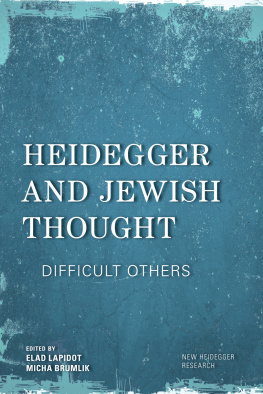
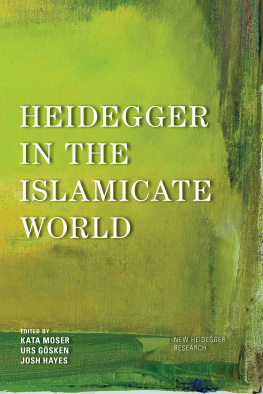

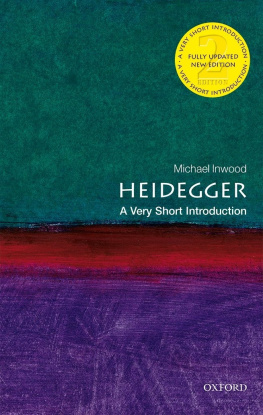
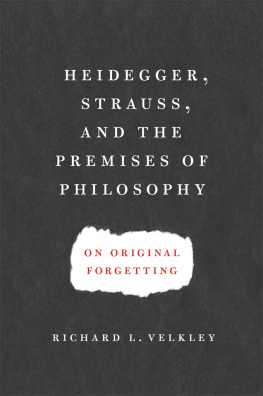

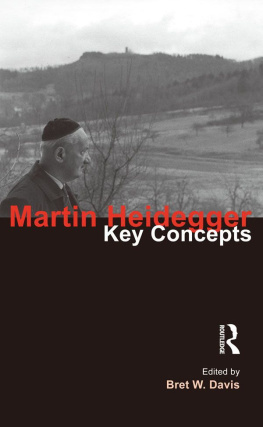

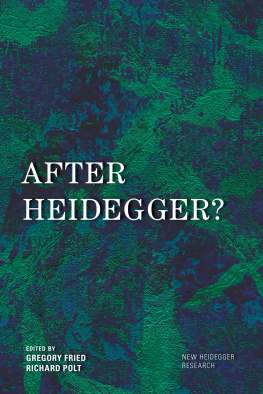
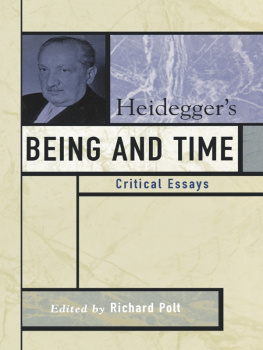
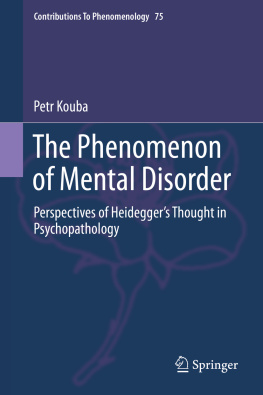


 The paper used in this publication meets the minimum requirements of American National Standard for Information SciencesPermanence of Paper for Printed Library Materials, ANSI/NISO Z39.481992.
The paper used in this publication meets the minimum requirements of American National Standard for Information SciencesPermanence of Paper for Printed Library Materials, ANSI/NISO Z39.481992.